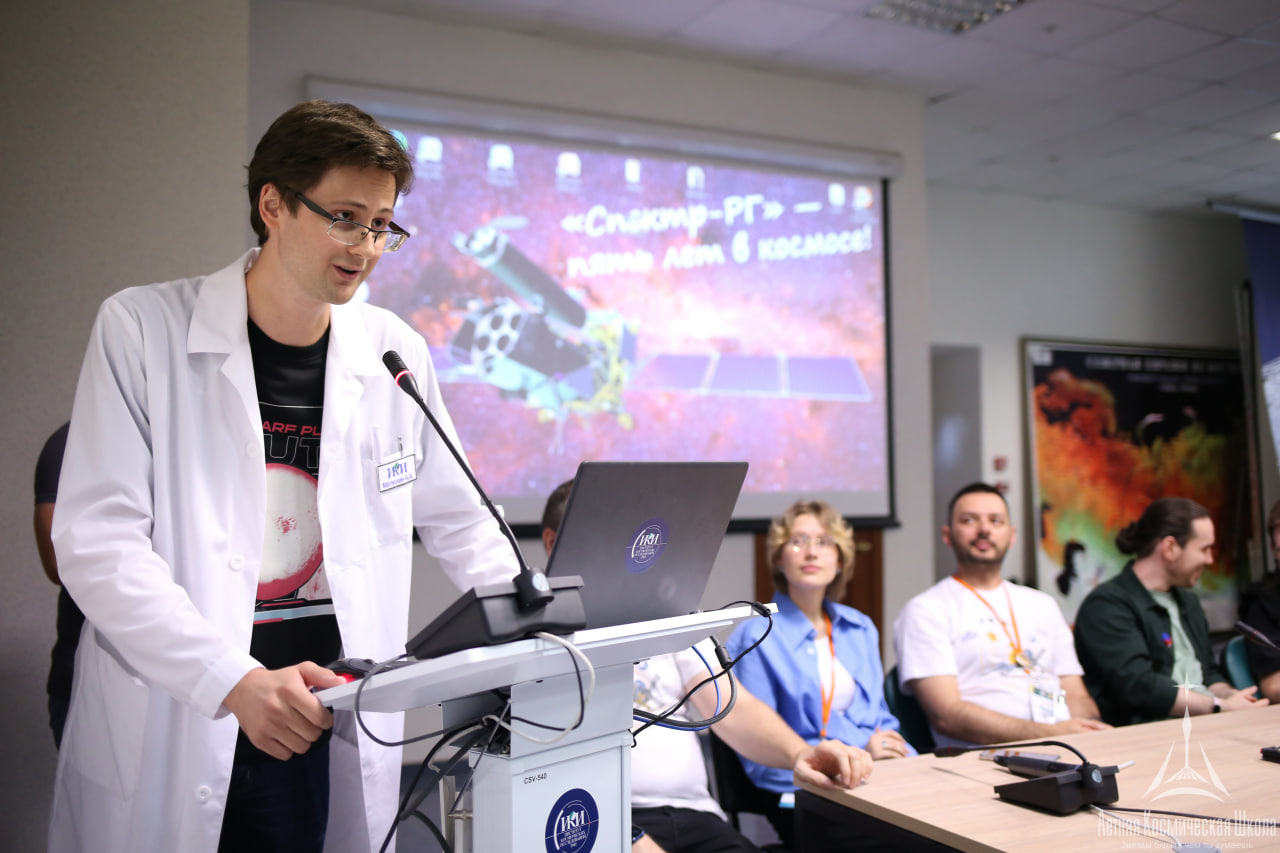The ninth Summer Space School was completed
From July 27 to August 4, 2024, with the support of Roscosmos State Corporation, the Institute of Space Research of the Russian Academy of Sciences hosted the ninth Space Summer School. This year's theme was the golden ribbon of the solar system.
The Summer Space School is organized by ANO Radiant Innovation Center and Space Research Institute of the Russian Academy of Sciences with the support of Roscosmos State Corporation.
Summer Space School is an educational project for space enthusiasts. The event is held annually in a face-to-face format. The program of the School consists of lectures, breakout sessions, excursions, space mission simulation and the final space intellectual game. For the third year in a row the School is held at the Space Research Institute of the Russian Academy of Sciences, and this time it gathered 173 participants from 39 cities of Russia.
More than 160 lectures were given by 98 experts, including representatives of leading research institutes: IKI RAS, IMBP RAS, GEOHI RAS, Lebedev Physical Institute RAS, MIIGAiK, VNIIR FGBU, Skoltech, industry enterprises: RSC Energia, Reshetnev ISS, NPO Energomash, and private space companies: "Bureau 1440, SPUTNIKS, Geoscan, Education of the Future and many others.
School participants chose one of eight sections. Among them:
- Ballistics and orbital mechanics. Its participants learned the basics of space flight physics and learned how to plan and execute orbital maneuvers. In the space flight simulation, ballisticians were responsible for planning and optimizing the trajectory of the virtual spacecraft in accordance with the requirements necessary to achieve all scientific goals.
- Rocket and space technology. Here the participants assembled cubesat spacecraft, manufactured and tested the operation of several types of docking devices using 3D printing, and practiced the methods of landing spacecraft on various celestial bodies on a space flight simulator. In the simulation of a scientific expedition to the Solar System, the section participants were responsible for piloting the expedition ship and its landing vehicles and rovers, as well as for drawing up cyclograms of scientific experiments in terms of power supply and automation systems.
- Satellite and space communications. In this section, participants assembled satellite models in cubesat format and tested them. Having made with their own hands several antennas of different types, they tested the operation of the ground station and conducted a series of communication sessions with various spacecraft for reception and transmission.
- Planetary research. Section participants learned to determine the spectral composition of the atmosphere by spectral changes and mineral composition of the surface by hyperspectral imaging data, conducted experiments with substances analogs of lunar and Martian soil, worked with thin slices (slices) of various types of meteoritic matter. In the simulation of the scientific expedition, the participants of this section were responsible for the selection of targets for experiments at each stage of the simulation, for the development of requirements for the trajectory of the spacecraft, the compilation of cyclograms of experiments in terms of the operation of scientific equipment, the collection and analysis of scientific data obtained during experiments with the virtual observatory approach.
- Heliophysics and the interplanetary medium. Participants in this section made observations of the Sun using a telescope with special filters, learned to calculate the relative number of sunspots using the citizen science service Zooniverse, learned to classify types of structures in images of auroras, and worked with thin slices of meteoritic material.
- Remote sensing. Here the participants learned how to process data received from satellites and apply them to solve various tasks related to the study of the solar system and the Earth. They mastered methods of surface classification, estimation of vegetation density, monitoring of atmospheric pollution, analysis of changes in natural and anthropogenic objects. They also worked with various tools and software packages for processing and analyzing remote sensing data.
- Space medicine and biology. Section for those interested in medical aspects of astronautics. Section participants studied methods of psychological support for the crew, the effect of microgravity on the human body, and the possibility of growing plants in spacecraft conditions. During the simulation they monitored the psycho-emotional state of the crew and performed the role of onboard doctors.
- Science journalism. The participants learned how to talk about science in different formats: popular science articles, blog posts, podcasts and so on. In the space flight simulation, they played the role of communication operators between the crew and Earth and covered the progress of the mission.
During the excursion day the participants visited RSC Energia, Cosmonaut Training Center, Bear Lakes Space Communication Center, NPO Energomash, NPO Mashinostroeniya, IMBP RAS, Moscow Aviation Repair Plant of DOSAAF in Balashikha, Khrunichev Center, NPO named after S.A. Lavochkin and the Center of Aviation and Cosmonautics at VDNKh.
Partners: Yuri Gagarin Research Institute of the CPC, Institute of Medical and Biological Problems of the Russian Academy of Sciences, Lebedev Physical Institute of the Russian Academy of Sciences, St. Petersburg State University, ANO Rosmosmos Media, Sputniks LLC, CosmoMerch, VR Center of the Moscow State University named after M.V. Lomonosov, Empathy Foundation, Trajectory Foundation, Alpine Non-Fiction Publishing House, Bombora Publishing House, Piterba Publishing House. Lomonosov Moscow State University, Empathy Foundation, Trajectory Foundation, Alpina Non-Fiction Publishing House, Bombora Publishing House, Piter Publishing House, Education of the Future LLC, Pro Cosmos, Star Engine, Congress Plus Company, Lectorium and many others.
Source: IKI RAS
